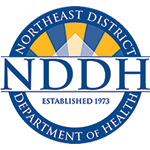Emergency Planning
Preparedness starts with partnerships.
Be in the know and ready to go.
NDDH works with a number of community planning partners to prepare for public health emergencies that impact the lives of our constituents. Together, we develop plans and conduct tabletop drills and full-scale preparedness exercises in order to respond to a range of public health threats, including infectious diseases, natural disasters, and biological, chemical, nuclear, and radiological events. Some examples of our work include:
- Administered thousands of COVID-19 vaccinations to the local community, during the pandemic, thanks to the help of our Medical Reserve Corps volunteers and community partners.
- Full-scale exercises have tested the capabilities of our Mass Dispensing Points of Dispensing (PODS) operations, which would require us to dispense medications to all residents within our district in a short amount of time.
- An October 25, 2015 drive-through flu clinic held at Killingly Intermediate School proved to be an effective and efficient way to deliver influenza vaccinations.
- NDDH developed response plans and participated in activities related to the 2004-05 National Influenza Vaccination Shortage, 2009 H1N1 Pandemic Influenza, and the 2014 Ebola Epidemic.
- In 2006, NDDH was one of seven lead health departments selected to coordinate a clinic for a statewide, full scale exercise of the Centers for Disease Control and Prevention’s (CDC) Strategic National Stockpile Plan.
- NDDH took a lead role in protecting public health during the April, 2005 InterRoyal Mill Fire in Plainfield. Years later, we continue to provide support by helping town leaders to inform residents of proposed clean-up activities.
NDDH also participates in regular meetings of Region 4 ESF #5 School Safety Subcommittee and Emergency Support Function #8. According to the U.S. Department of Health and Human Services, ESF #8 is the Public Health and Medical Services section of a national organizational structure of governmental and private sector capabilities designed to provide support and services that help victims and communities return to normal following domestic incidents.
Funding for emergency planning activities has been provided by the Connecticut Department of Public Health through a Public Health Emergency Planning (PHEP) cooperative agreement with the CDC’s Office of Public Health Readiness and Response. Preparedness activities funded by the PHEP cooperative agreement are targeted specifically for the development of emergency-ready public health departments that are flexible and adaptable.




